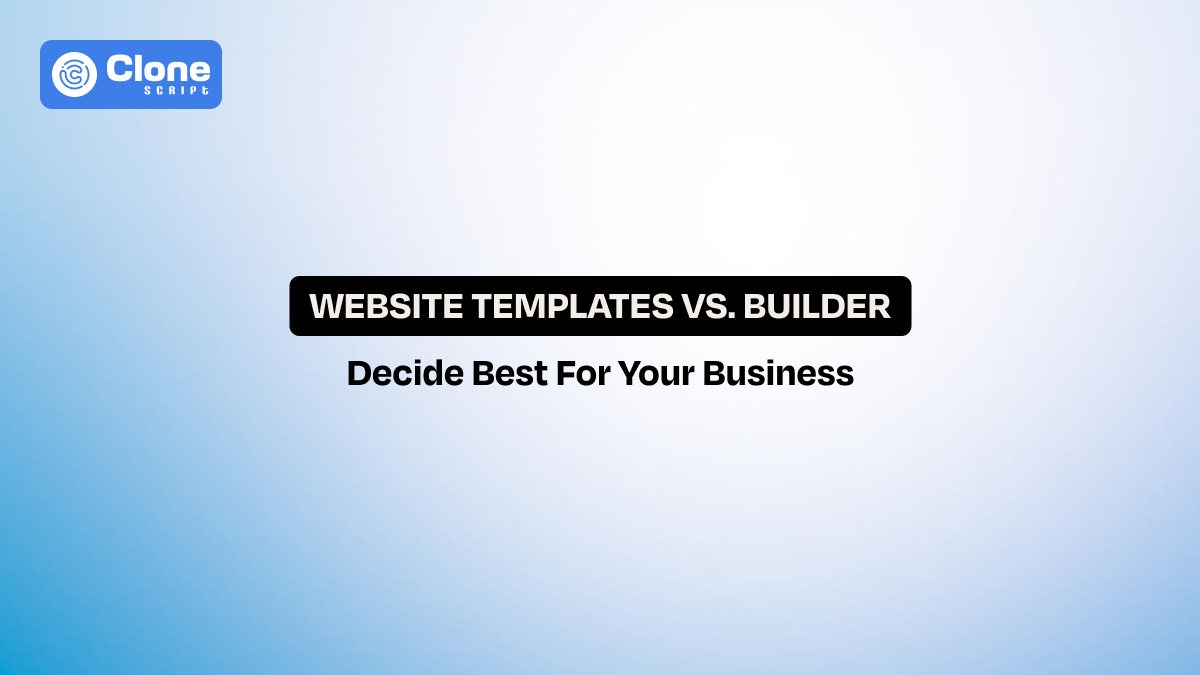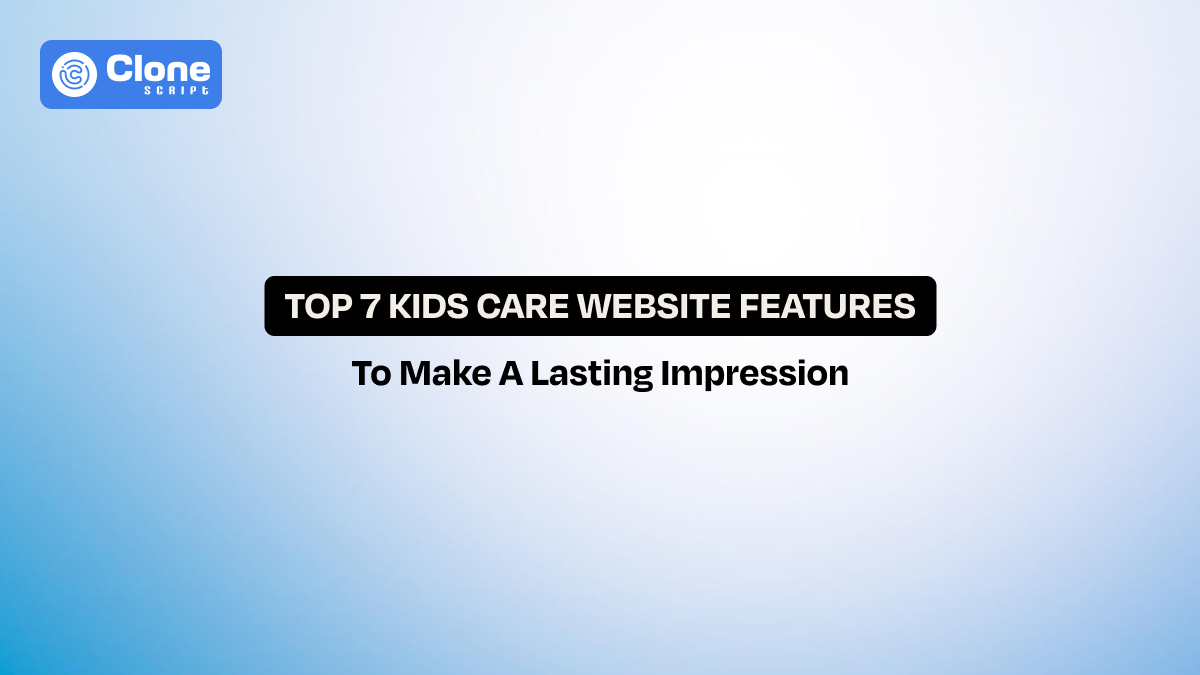Website Templates vs. Builders: Pros, Cons, and Best Option for Your Business
For modern businesses, a website is no longer a digital brochure. It’s a primary channel through which customers perceive trust, professionalism, and credibility. When developing a website, business owners are typically faced with two cost-effective and accessible options: website templates or website builders. Each option comes with advantages and limitations that impact cost, scalability, and long-term digital growth.
This blog offers a detailed website templates vs. website builder comparison, exploring the pros and cons, and current market insights. Also, we clarify strategic recommendations to help businesses choose the right option for their needs.
First, let’s understand the website template.
What Are Website Templates?
Website templates are pre-designed frameworks that define the layout, style, and structure of a website. They can be as simple as static HTML and CSS files or as advanced as dynamic themes built for platforms like WordPress, Shopify, and Joomla. Templates eliminate the need to design from scratch, giving developers a professional foundation to work from.
There are generally three categories of website templates:
-
Free Templates – These are widely available online and provide a basic structure for simple projects. While cost-effective, they often lack customization, advanced features, and originality.
-
Premium Templates – Available on marketplaces, these templates typically cost between $30 and $200. Mobile-friendly web templates include UI designs, modern layouts, and support options. They are suitable for small and medium businesses.
-
Industry-Specific Templates – Designed with particular niches in mind, such as healthcare, real estate, e-commerce, or education. These templates integrate features tailored to those industries, reducing the need for heavy modifications.
Website templates are especially attractive to startups because they reduce both development costs and time-to-market, while offering the flexibility to scale with plugins or customizations.
After knowing the web templates, it’s time to clarify the website builder.
What Is a Website Builder?
A website builder is a platform that allows businesses to create and manage websites through intuitive interfaces, often without requiring technical expertise. Builders combine essential elements like hosting, domain registration, SSL security, and content management into one subscription service.
There are several categories of website builders:
-
Drag-and-Drop Builders – Platforms like Wix and Squarespace fall into this category, providing intuitive tools where users can arrange design elements visually.
-
E-Commerce Builders – Shopify and BigCommerce are designed specifically for businesses that need payment gateways, product catalogs, and secure checkout systems.
-
Advanced Builders – Tools like Webflow cater to businesses that need a balance between simplicity and design freedom. It allows adding more custom features without requiring a full coding environment.
The global website builder market is projected to reach $3.46 billion by 2030, reflecting how many businesses rely on these platforms for quick and efficient website creation.
For business owners without in-house technical support, website builders represent a reliable solution for establishing an online presence without dealing with the complexities of separate hosting or coding.
It’s not enough to understand the definition of website templates and builders. To distinguish between these two options, the advantages and disadvantages help to decide which one is the best.
Pros and Cons of Website Templates
By knowing why a template is a good choice ahead of the website builders, you will make a better decision.
Pros of Website Templates
Here is an overview of the advantages of choosing website templates:
-
Cost-Effective in the Long Term
Website templates generally involve a one-time purchase. This makes them significantly cheaper than recurring subscription costs from builders. After the initial purchase, businesses only need to pay for hosting and occasional plugin updates. This cost model allows startups to preserve financial resources while maintaining ownership of their website.
-
Greater Control and Flexibility
Templates give businesses more freedom to edit code, install plugins, and make changes that align with unique branding requirements. This flexibility helps the business grow, and the website can evolve without being confined to the limitations of a single platform.
-
Scalability for Future Growth
Since templates are not tied to proprietary systems, businesses can move their website to different hosting environments as needed. Whether scaling traffic with a VPS or integrating advanced features, templates support growth with fewer barriers.
-
Ownership of Digital Assets
Purchasing a premium template means owning the files and content outright. Unlike website builders, where design is tied to the provider, templates allow businesses to retain full control, offering independence and long-term stability.
-
Potential for Better Performance
Well-coded templates are often lighter than builder-generated sites, which can become bloated with unnecessary scripts. Lightweight templates result in faster page load times, improved user experience, and stronger SEO performance.
Cons of Website Templates
Don’t think the web templates are always useful. They have some drawbacks:
-
Requires Technical Knowledge
Customizing and maintaining templates often demands basic coding knowledge. Business owners without technical expertise may need to hire developers, which introduces additional costs. It indirectly pushes to develop the site with the help of expert web developers.
-
Maintenance Responsibility
Unlike website builders that handle updates automatically, templates require ongoing monitoring. You have to take developers to help in updating themes, plugins, and security features regularly to avoid vulnerabilities.
-
Design Similarity Across Businesses
Since popular templates are used widely, multiple businesses may end up with websites that look strikingly similar. Achieving a unique appearance often requires significant customization work.
-
Initial Setup Complexity
Setting up hosting, domains, SSL certificates, and plugin integrations can be overwhelming for beginners. Businesses must allocate time or resources to ensure proper configuration. If any issue persists in this process, then it is exposed to attackers.
-
Hidden Costs
While templates are marketed as budget-friendly, costs such as premium plugins, third-party tools, and developer fees can increase overall expenses. These factors make the budget harder to control.
Pros and Cons of Website Builders
Website builders are usually chosen by startups and new local brands to be available online with minimal expenses.
Pros of Website Builders
From these advantages, a builder platform for website setup is becoming famous:
-
Beginner-Friendly Design Process
Website builders eliminate the need for coding skills by offering drag-and-drop editors. This simplicity allows small businesses and solo entrepreneurs to launch functional websites quickly without professional help.
-
All-in-One Solution
Builders typically include hosting, SSL certificates, domain management, and customer support in one package. This reduces the complexity of handling multiple vendors, saving time and reducing technical headaches.
-
Faster Time-to-Market
Businesses can have a live website within hours instead of weeks. For industries where speed is essential—such as product launches or service promotions—builders provide an unmatched advantage.
-
Built-In Tools and Features
Modern website builders integrate SEO settings, analytics, e-commerce options, and marketing tools. Businesses benefit from these pre-configured features without additional installations or custom coding.
-
Mobile Responsiveness by Default
Most reputable website builders ensure their templates are optimized for mobile devices. This automatic responsiveness helps businesses cater to mobile-first audiences without additional adjustments.
Cons of Website Builders
The pitfalls of choosing website builders are as follows:
-
Recurring Subscription Costs
Website builders operate on a subscription model, often costing between $10 and $300 per month. Over several years, these fees typically surpass the one-time cost of templates. It means even if the site has 100 visitors or 10k visitors per month, they have to pay the fixed price.
-
Limited Customization Options
Builders restrict users to what the platform allows. Businesses needing unique layouts, specialized functionality, or deep backend development may find these limitations frustrating.
-
Vendor Lock-In
Websites created with builders are usually tied to the platform. This makes migration to another system complex and expensive. Businesses risk losing flexibility and independence in the long run. This is a red flag for a startup to keep competing with its competitors.
-
Performance Limitations
Builder-generated websites sometimes include unnecessary scripts or features that slow performance. Page speed, which directly affects SEO rankings, can be compromised as a result. Ultimately, the overall user experience is disturbed and results in low lead generation.
-
Scaling Restrictions
While builders work well for small businesses, they usually struggle with large-scale requirements. High-traffic sites or enterprises requiring custom solutions may eventually need to migrate to more robust setups.
The question is still in your mind: which to choose, a website template or a website building platform?
Here is the table for comparing these two options.
| Feature |
Website Templates |
Website Builders |
|---|---|---|
|
Cost |
One-time purchase ($30–$200) + hosting costs |
Recurring subscription ($10–$300/month) |
|
Ease of Use |
Requires technical knowledge or developer support |
Beginner-friendly drag-and-drop interface |
|
Customization |
Highly flexible (with coding/plugins) |
Limited customization options |
|
Time to Launch |
Days to weeks, depending on customization |
Hours to days |
|
Scalability |
Excellent for growth with plugins & integrations |
Limited, may need migration later |
| Uniqueness |
Risk of similar-looking sites if the template is popular |
More variety, but still standardized |
| Ownership |
Full control over hosting and code |
Vendor lock-in with the builder platform |
|
Best Fit For |
Startups with developers, businesses wanting flexibility |
Small businesses & entrepreneurs seeking speed |
Which Is the Best Option for Your Business?
Choosing between a website template and a website builder depends on business stage, goals, and technical comfort level.
-
Startups and Small Businesses on Tight Budgets
Website templates are ideal because they involve a one-time cost, offer scalability, and ensure ownership of assets. Startups benefit from the flexibility to grow without being tied to recurring subscriptions.
-
Entrepreneurs Needing Speed and Simplicity
Website builders provide the fastest way to establish a professional online presence. With hosting, security, and responsiveness included, they minimize technical overhead and allow entrepreneurs to focus on operations.
-
Growth-Oriented Businesses
Templates provide a superior option for businesses planning long-term growth. They can integrate plugins, enable custom website design, and manage better performance optimizations over time.
-
Non-Technical Business Owners
Builders such as Wix, Squarespace, or Shopify remain the best website builders for small businesses owned by individuals without technical expertise. They simplify management while still offering professional design quality.
Ultimately, the choice between templates vs. builders depends on priorities. Businesses seeking independence and scalability should go toward templates, while those prioritizing speed and simplicity should consider builders.
Looking for the best website templates to start development? We have HTML, CSS, Tailwind, Bootstrap, and React frontend framework templates.
Conclusion
The decision between website templates and website builders is not universal—it depends on business objectives, budget, and technical capacity. Website templates excel in offering ownership, flexibility, and scalability, but require technical expertise and continuous maintenance. Website builders, on the other hand, deliver unmatched ease of use and speed but come with long-term costs, vendor lock-in, and limited customization.
Both approaches serve different goals, and the right decision ensures a website that not only looks professional but also supports sustainable business growth.
FAQs
- Which is better: a website builder or a template?
A website builder is better for speed and ease of use, while a template is better for flexibility, ownership, and scalability. The right choice depends on budget and technical comfort level.
- What are the pros and cons of website templates?
Templates are cost-effective, customizable, and scalable, but they require technical expertise, ongoing maintenance, and risk design similarity if not heavily customized.
- What is the best website builder for small businesses?
Platforms like Wix, Squarespace, and Shopify are widely regarded as the best website builders for small business owners because they combine user-friendly design with integrated tools for growth.
- Are responsive web templates good for businesses?
Yes. Responsive web templates for businesses improve mobile compatibility, enhance SEO rankings, and give a smoother user experience. To lead the business to higher customer retention and conversions, it is needed.
- Website builder vs coding from scratch: which is better?
Builders are better for small businesses due to affordability and simplicity, while coding from scratch is ideal for enterprises requiring complete customization, unique features, and large-scale scalability.
- What are the advantages of using website templates for startups?
They allow startups to launch professional websites quickly, keep costs low, and provide a foundation that can be scaled with plugins or custom designs as the business grows.
- Can a business switch from a website builder to templates later?
Yes, but migration can be complex and often requires redesign. Many businesses begin with builders for speed and later adopt templates when they need more control and scalability.
 BTC - Bitcoin
BTC - Bitcoin
 USDTERC20 - USDT ERC20
USDTERC20 - USDT ERC20
 ETH - Ethereum
ETH - Ethereum
 BNB - Binance
BNB - Binance
 BCH - Bitcoin Cash
BCH - Bitcoin Cash
 DOGE - Dogecoin
DOGE - Dogecoin
 TRX - TRON
TRX - TRON
 USDTTRC20 - USD TRC20
USDTTRC20 - USD TRC20
 LTC - LiteCoin
LTC - LiteCoin







